《情态动词can与could的用法》知识点-参考模板
情态动词can与could用法归纳
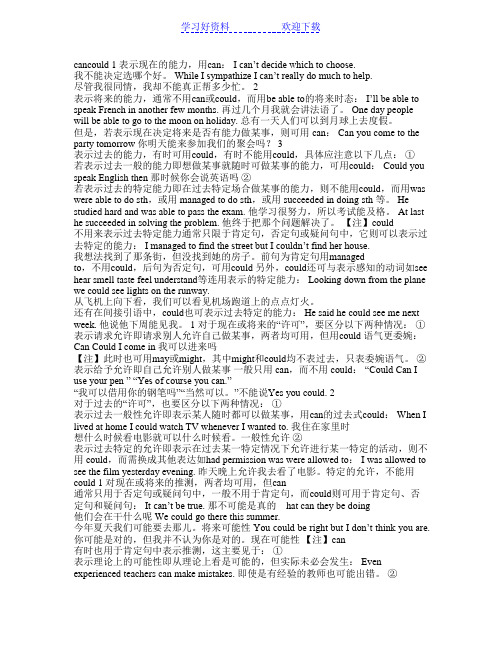
cancould 1 表示现在的能力,用can: I can’t decide which to choose.我不能决定选哪个好。
While I sympathize I can’t really do much to help.尽管我很同情,我却不能真正帮多少忙。
2表示将来的能力,通常不用can或could,而用be able to的将来时态: I’ll be able to speak French in another few months. 再过几个月我就会讲法语了。
One day people will be able to go to the moon on holiday. 总有一天人们可以到月球上去度假。
但是,若表示现在决定将来是否有能力做某事,则可用 can: Can you come to the party tomorrow 你明天能来参加我们的聚会吗? 3表示过去的能力,有时可用could,有时不能用could,具体应注意以下几点:①若表示过去一般的能力即想做某事就随时可做某事的能力,可用could: Could you speak English then 那时候你会说英语吗②若表示过去的特定能力即在过去特定场合做某事的能力,则不能用could,而用was were able to do sth,或用 managed to do sth,或用 succeeded in doing sth 等。
He studied hard and was able to pass the exam. 他学习很努力,所以考试能及格。
At last he succeeded in solving the problem. 他终于把那个问题解决了。
【注】could不用来表示过去特定能力通常只限于肯定句,否定句或疑问句中,它则可以表示过去特定的能力: I managed to find the street but I couldn’t find her house.我想法找到了那条街,但没找到她的房子。
(完整word版)情态动词can(could),may(might)的用法
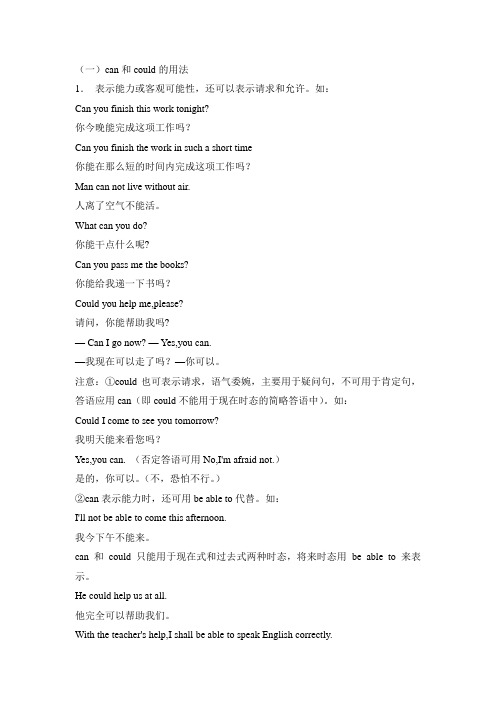
(一)can和could的用法1.表示能力或客观可能性,还可以表示请求和允许。
如:Can you finish this work tonight?你今晚能完成这项工作吗?Can you finish the work in such a short time你能在那么短的时间内完成这项工作吗?Man can not live without air.人离了空气不能活。
What can you do?你能干点什么呢?Can you pass me the books?你能给我递一下书吗?Could you help me,please?请问,你能帮助我吗?— Can I go now? — Yes,you can.—我现在可以走了吗?—你可以。
注意:①could也可表示请求,语气委婉,主要用于疑问句,不可用于肯定句,答语应用can(即could不能用于现在时态的简略答语中)。
如:Could I come to see you tomorrow?我明天能来看您吗?Yes,you can. (否定答语可用No,I'm afraid not.)是的,你可以。
(不,恐怕不行。
)②can表示能力时,还可用be able to代替。
如:I'll not be able to come this afternoon.我今下午不能来。
can 和could 只能用于现在式和过去式两种时态,将来时态用be able to 来表示。
He could help us at all.他完全可以帮助我们。
With the teacher's help,I shall be able to speak English correctly.由于老师的帮助,我将能准确地讲英语。
2. “can”表达推测例:Can the news be true? 这消息会是真的吗?The news can't be true. 这消息不会是真的吧。
高考英语情态动词语法知识点与用法
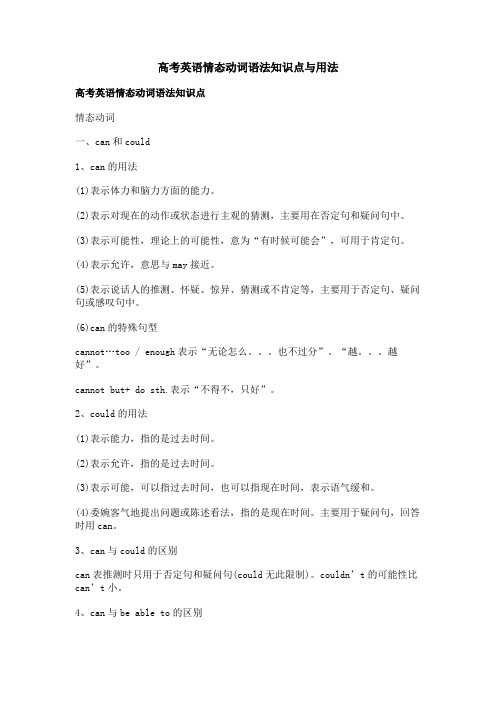
高考英语情态动词语法知识点与用法高考英语情态动词语法知识点情态动词一、can和could1、can的用法(1)表示体力和脑力方面的能力。
(2)表示对现在的动作或状态进行主观的猜测,主要用在否定句和疑问句中。
(3)表示可能性,理论上的可能性,意为“有时候可能会”,可用于肯定句。
(4)表示允许,意思与may接近。
(5)表示说话人的推测、怀疑、惊异、猜测或不肯定等,主要用于否定句、疑问句或感叹句中。
(6)can的特殊句型cannot…too / enough表示“无论怎么。
也不过分”。
“越。
越好”。
cannot but+ do sth.表示“不得不,只好”。
2、could的用法(1)表示能力,指的是过去时间。
(2)表示允许,指的是过去时间。
(3)表示可能,可以指过去时间,也可以指现在时间,表示语气缓和。
(4)委婉客气地提出问题或陈述看法,指的是现在时间。
主要用于疑问句,回答时用can。
3、can与could的区别can表推测时只用于否定句和疑问句(could无此限制)。
couldn’t的可能性比can’t小。
4、can与be able to的区别(1)现在时:无区别,但后者不常用。
(2)完成时;can没有完成时,此时要用have(has,had)been able to。
(3)将来时:can没有将来时,要用will be able to。
(4)过去时:could表示一般能力,was/were able to 表示在具体场合通过努力成功做成某事的能力。
二、may 和might1、may的用法(1)表示询问或说明一件事可不可以做。
(2)表示一件事或许会发生或某种情况可能会存在,通常用在肯定句和否定句中。
注意:表示可能性时,can’t语气强,表示“不可能”,may not语气弱,表示“可能不”。
2、might的用法(1)表示询问或允许,指的是过去时间。
(2)表示可能发生的事,可以指过去时间,也可以指现在时间,语气更加不肯定,可能性比may小一些。
英语语法学习----情态动词can, could的用法

英语语法学习----情态动词can, could的用法
(1)can的用法
can表示某人具有某种能力,意思为“能,会”,也表示客观的可能性,是“能够,可能”的意思。
后接动词原形,适用于所有人称。
(2)could的用法
could为can的过去式,表示“能,可以”,另外could可用来代替can,表示更为客气委婉的语气,用来提出要求,但回答时不能用could,而要用can.
Could you swim when you were young? No, I couldn’t. (问能力) Could I smoke here? No, you can’t. (表示委婉的请求)
其他回答:Go ahead./Help yourself./No problem./You’d better not./I’m afraid you can’t.
II、感叹句的用法
感叹句用来表示强烈的感情,能表达愤怒、悲哀、惊奇、厌恶和赞赏等。
句末用感叹号“!”,读时用降调。
在口语中常用省略句,后面的主语和谓语往往省略,有时只用一个词或词组表达。
(1)以what开头的感叹句,what作定语,修饰名词(名词前可有其他定语),可数名词单数形式前要加不定冠词a(an)。
句型:What (a/an)+adj.+n.(+s+v)! 如:
What a clever boy(he is )! 多么聪明的孩子!。
情态动词can与could用法归纳

情态动词c an与c ould用法归纳1. 表示能力can 与could 表示能力时,请注意以下用法:(1) 表示现在的能力,用c an:My sister can drive. 我妹妹会开车。
Everyone here can speak English. 这儿人人会说英语。
(2) 表示将来的能力,通常不用c an或c ould,而用b e able to的将来时态:I’ll be able to speak French in another few months. 再过几个月我就会讲法语了。
One day people will be able to go to the moon on holiday. 总有一天人们可以到月球上去度假。
但是,若表示现在决定将来是否有能力做某事,则可用can:Can you come to the party tomorrow? 你明天能来参加我们的聚会吗?(3) 表示过去的能力,有时可用c ould,有时不能用c ould,具体应注意以下几点:①若表示过去一般的能力(即想做某事就随时可做某事的能力),可用c ould:Could you speak English then? 那时候你会说英语吗?②若表示过去的特定能力(即在过去特定场合做某事的能力),则不能用c ould,而用w as (were) able to do sth,或用managed to do sth,或用succeeded in doing sth 等。
He studied hard and was able to pass the exam. 他学习很努力,所以考试能及格。
At last he succeeded in solving the problem. 他终于把那个问题解决了。
【注】c ould 不用来表示过去特定能力通常只限于肯定句,否定句或疑问句中,它则可以表示过去特定的能力:I managed to find the street, but I couldn’t find her house. 我想法找到了那条街,但没找到她的房子。
八年级上册英语语法《情态动词can与could的用法》知识点

can与could的用法一、表示能力(1) 表示现在的能力,用can:My sister can drive. 我妹妹会开车。
Everyone here can speak English. 这儿人人会说英语。
(2) 表示将来的能力,通常不用can或could,而用be able to的将来时态:I’ll be able to speak French in another few months. 再过几个月我就会讲法语了。
One day people will be able to go to the moon on holiday. 总有一天人们可以到月球上去度假。
但是,若表示现在决定将来是否有能力做某事,则可用can:Can you come to the party tomorrow? 你明天能来参加我们的聚会吗?(3) 表示过去的能力,有时可用could,有时不能用could,具体应注意以下几点:①若表示过去一般的能力(即想做某事就随时可做某事的能力),可用could:Could you speak English then? 那时候你会说英语吗?②若表示过去的特定能力(即在过去特定场合做某事的能力),则不能用could,而用was (were) able to do sth,或用managed to do sth,或用succeeded in doing sth 等。
He studied hard and was able to pass the exam. 他学习很努力,所以考试能及格。
At last he succeeded in solving the problem. 他终于把那个问题解决了。
【注】could 不用来表示过去特定能力通常只限于肯定句,否定句或疑问句中,它则可以表示过去特定的能力:I managed to find the street, but I couldn’t find her house. 我想法找到了那条街,但没找到她的房子。
情态动词can(could)的用法
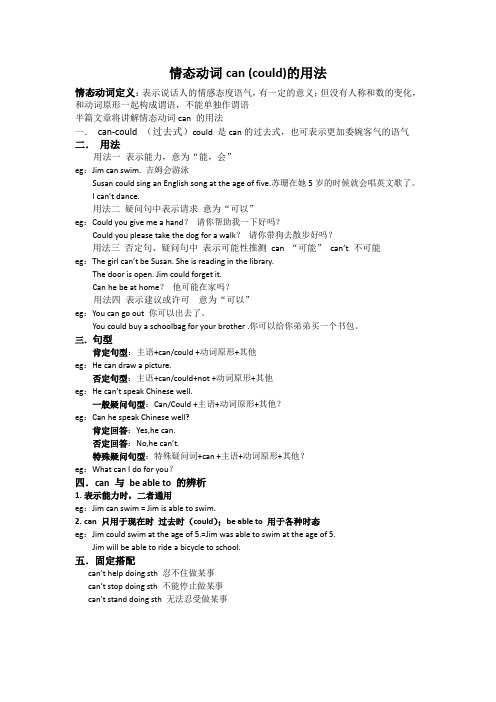
情态动词can (could)的用法情态动词定义:表示说话人的情感态度语气,有一定的意义;但没有人称和数的变化,和动词原形一起构成谓语,不能单独作谓语半篇文章将讲解情态动词can 的用法一.can-could (过去式)could 是can的过去式,也可表示更加委婉客气的语气二.用法用法一表示能力,意为“能,会”eg:Jim can swim. 吉姆会游泳Susan could sing an English song at the age of five.苏珊在她5岁的时候就会唱英文歌了。
I can’t dance.用法二疑问句中表示请求意为“可以”eg:Could you give me a hand?请你帮助我一下好吗?Could you please take the dog for a walk?请你带狗去散步好吗?用法三否定句、疑问句中表示可能性推测can “可能”can’t 不可能eg:The girl can’t be Susan. She is reading in the library.The door is open. Jim could forget it.Can he be at home?他可能在家吗?用法四表示建议或许可意为“可以”eg:You can go out 你可以出去了。
You could buy a schoolbag for your brother .你可以给你弟弟买一个书包。
三.句型肯定句型:主语+can/could +动词原形+其他eg:He can draw a picture.否定句型:主语+can/could+not +动词原形+其他eg:He can’t speak Chinese well.一般疑问句型:Can/Could +主语+动词原形+其他?eg:Can he speak Chinese well?肯定回答:Yes,he can.否定回答:No,he can’t.特殊疑问句型:特殊疑问词+can +主语+动词原形+其他?eg:What can I do for you?四.can 与be able to 的辨析1.表示能力时,二者通用eg:Jim can swim = Jim is able to swim.2.can 只用于现在时过去时(could);be able to 用于各种时态eg:Jim could swim at the age of 5.=Jim was able to swim at the age of 5.Jim will be able to ride a bicycle to school.五.固定搭配can’t help doing sth 忍不住做某事can’t stop doing sth 不能停止做某事can’t stand doing sth 无法忍受做某事六.could 表示更加委婉客气的请求1.委婉请求别人做某事(提出请求)句型:Could you (please) do sth? /Could you please not do sth?肯定回答:Yes,I can. /Sure./Certainly./Of course I can,/No problem.否定回答:Sorry,I can’t+原因/I’m afraid I can’t+原因eg:Could you please take the bag to the living room?Yes,sure.2.委婉请求别人允许自己做某事(征求许可)句型:Could I do sth?肯定回答:Yes,you can./Yes, please.否定回答:No,you can’t/I’m afraid you can’teg:Could I play with my best friend?I’m afraid you can’t.You have too much homework to do.。
情态动词can和could的用法
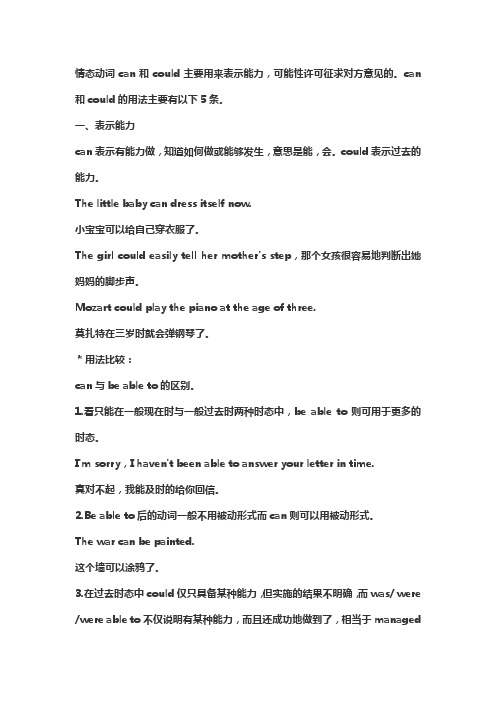
情态动词can和could主要用来表示能力,可能性许可征求对方意见的。
can 和could的用法主要有以下5条。
一、表示能力can表示有能力做,知道如何做或能够发生,意思是能,会。
could表示过去的能力。
The little baby can dress itself now.小宝宝可以给自己穿衣服了。
The girl could easily tell her mother's step,那个女孩很容易地判断出她妈妈的脚步声。
Mozart could play the piano at the age of three.莫扎特在三岁时就会弹钢琴了。
*用法比较:can与be able to的区别。
1.看只能在一般现在时与一般过去时两种时态中,be able to则可用于更多的时态。
I'm sorry,I haven't been able to answer your letter in time.真对不起,我能及时的给你回信。
2.Be able to后的动词一般不用被动形式而can则可以用被动形式。
The war can be painted.这个墙可以涂鸦了。
3.在过去时态中could仅只具备某种能力,但实施的结果不明确,而was/ were /were able to不仅说明有某种能力,而且还成功地做到了,相当于managedI talked with the boy for a long time and eventually I was able to make him believe me.我和那个男孩谈了很久,最终还是让他相信了我的话。
二、表示可能性1.用在肯定句中,表示理论上的可能性,指常有的行为或情形,意思是有时会……。
Tom can be really annoying.他们有时的确令人讨厌。
It can be very hot here in summer.这里夏天有时会很热。
- 1、下载文档前请自行甄别文档内容的完整性,平台不提供额外的编辑、内容补充、找答案等附加服务。
- 2、"仅部分预览"的文档,不可在线预览部分如存在完整性等问题,可反馈申请退款(可完整预览的文档不适用该条件!)。
- 3、如文档侵犯您的权益,请联系客服反馈,我们会尽快为您处理(人工客服工作时间:9:00-18:30)。
can与could的用法
一、表示能力
(1) 表示现在的能力,用can:
My sister can drive. 我妹妹会开车。
Everyone here can speak English. 这儿人人会说英语。
(2) 表示将来的能力,通常不用can或could,而用be able to的将来时态:
I’ll be able to speak French in another few months. 再过几个月我就会讲法语了。
One day people will be able to go to the moon on holiday. 总有一天人们可以到月球上去度假。
但是,若表示现在决定将来是否有能力做某事,则可用can: Can you come to the party tomorrow? 你明天能来参加我们的聚会吗?
(3) 表示过去的能力,有时可用could,有时不能用could,具体应注意以下几点:
①若表示过去一般的能力(即想做某事就随时可做某事的能力),可用could:
Could you speak English then? 那时候你会说英语吗?
②若表示过去的特定能力(即在过去特定场合做某事的能力),则不能用could,而用was (were) able to do sth,或用managed to do sth,或用succeeded in doing sth 等。
He studied hard and was able to pass the exam. 他学习很努力,所以考试能及格。
At last he succeeded in solving the problem. 他终于把那个问题解决了。
【注】could 不用来表示过去特定能力通常只限于肯定句,否定句或疑问句中,它则可以表示过去特定的能力:
I managed to find the street, but I couldn’t find her house. 我想法找到了那条街,但没找到她的房子。
(前句为肯定句用managed to,不用could,后句为否定句,可用could)
另外,could还可与表示感知的动词(如see, hear, smell, taste, feel, understand等)连用表示的特定能力:
Looking down from the plane, we could see lights on the runway. 从飞机上向下看,我们可以看见机场跑道上的点点灯火。
还有在间接引语中,could也可表示过去特定的能力:
He said he could see me next week. 他说他下周能见我。
二、表示许可
(1) 对于现在或将来的“许可”,要区分以下两种情况:
①表示请求允许(即请求别人允许自己做某事),两者均可用,但用could 语气更委婉:
Can [Could] I come in? 我可以进来吗?
【注】此时也可用may或might,其中might和could均不表过去,只表委婉语气。
②表示给予允许(即自己允许别人做某事), 一般只用can,而不用could:
“Could [Can] I use your pen? ” “Yes, of course you can.” “我可以借用你的钢笔吗?”“当然可以。
”(不能说Yes, you could.)
(2) 对于过去的“许可”,也要区分以下两种情况:
①表示过去一般性允许(即表示某人随时都可以做某事),用can的过去式could:
When I lived at home, I could watch TV whenever I wanted to. 我住在家里时, 想什么时候看电影就可以什么时候看。
(一般性允许)
②表示过去特定的允许(即表示在过去某一特定情况下允许进行某一特定的活动),则不用could,而需换成其他表达(如had permission, was [were] allowed to):
I was allowed to see the film yesterday evening. 昨天晚上允许我去看了电影。
(特定的允许,不能用could)
三、表示推测
(1) 对现在或将来的推测,两者均可用,但can 通常只用于否定句或疑问句中,一般不用于肯定句,而could则可用于肯定句、否定句和疑问句:
It can’t be true. 那不可能是真的。
What can they be doing? 他们会在干什么呢?
We could go there this summer. 今年夏天我们可能要去那儿。
(将来可能性)
You could be right, but I don’t think you are. 你可能是对的,但
我并不认为你是对的。
(现在可能性)
【注】can 有时也用于肯定句中表示推测,这主要见于:
①表示理论上的可能性(即从理论上看是可能的,但实际未必会发生):
Even experienced teachers can make mistakes. 即使是有经验的教师也可能出错。
②用于含有only等表示限制的肯定句:(from)
“Who is that at the door? ” “It can only be the postman.”“门外是谁?”“只能是邮递员。
”
③后接“be (get, seem, become)+形容词”,表示“有时会”、“时常会”等:
It can get very hot here. 这里有时会很热。
She can be very unpleasant. 她有时很令人讨厌。
(2) 对过去的推测,必须在can, could 之后接动词的完成式。
但此时can仍只用于否定句或疑问句,不用于肯定句;而could则可用于各种句型:
He can’t [couldn’t] have seen her there. 他不可能在那儿见到她。
He could have gone home. 他可能已回家了。
Who could have taken it? 是谁把它拿走了呢?
I do not see how I could have done otherwise. 我看不出那时我还能有别的做法。
She could not have been more than sixteen. 那时她不可能超过十六岁。
I couldn’t have won, so I didn’t go in for the race. 我不可能获胜,因此我没参赛。
【注】could后接动词的完成式,除表示对过去的推测外,还有以下用法(不用can):
①表示过去没有实现的可能性(即某事本来可以发生,却没发生):
He could have told her, but he didn’t choose to. 他本来可以告诉她的,但他却没有。
I could have lent you the money. Why didn’t you ask me? 我本来可以借这笔钱给你的。
你为什么不问我?
②用来委婉地责备某人过去应该做某事而没有去做:
You could have been a little more considerate. 你本可考虑得更周到些的。
You could ask me before you use my phone. 你打电话之前可以问我一声。
You could have helped me why did you just sit and watch? 你本可帮助我的,为什么只坐在一旁瞧着?
③表示“差点儿就要”:
I could have died laughing. 我差点笑死了。
I was so angry I could have killed him. 我是那样生气,差点把他杀了。
She felt miserable. She could have cried. 她感到很痛苦,她差点哭了。
---精心整理,希望对您有所帮助。
